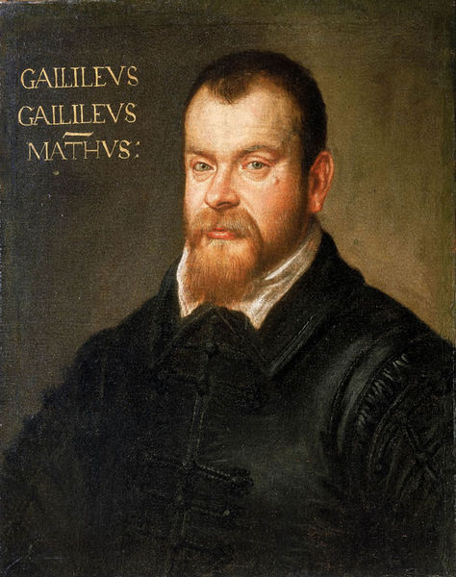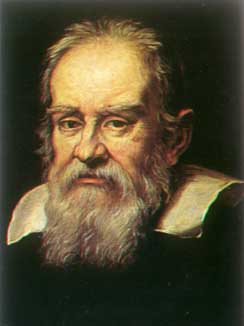The Sleepwalkers (169 page)
Authors: Arthur Koestler

What
he
did
was
to
found
the
modern
science
of
dynamics,
which
makes
him
rank
among
the
men
who
shaped
human
destiny.
It
provided
the
indispensable
complement
to
Kepler's
laws
for
Newton's
universe:
"If
I
have
been
able
to
see
farther,"
Newton
said,
"it
was
because
I
stood
on
the
shoulders
of
giants."
The
giants
were,
chiefly,
Kepler,
Galileo
and
Descartes.
2.
Youth of Galileo
Galileo
Galilei
was
born
in
1564
and
died
in
1642,
the
year
Newton
was
born.
His
father,
Vincento
Galilei,
was
an
impoverished
scion
of
the
lower
nobility,
a
man
of
remarkable
culture,
with
considerable
achievements
as
a
composer
and
writer
on
music,
a
contempt
for
authority,
and
radical
leanings.
He
wrote,
for
instance
(in
a
study
on
counter-point):
"It
appears
to
me
that
those
who
try
to
prove
an
assertion
by
relying
simply
on
the
weight
of
authority
act
very
absurdly."
1
One
feels
at
once
the
contrast
in
climate
between
the
childhoods
of
Galileo
and
our
previous
heroes.
Copernicus,
Tycho,
Kepler,
never
completely
severed
the
navel-cord
which
had
fed
into
them
the
rich,
mystic
sap
of
the
Middle
Ages.
Galileo
is
a
second-generation
intellectual,
a
second-generation
rebel
against
authority;
in
a
nineteenth
century
setting,
he
would
have
been
the
Socialist
son
of
a
Liberal
father.


His
early
portraits
show
a
ginger-haired,
short-necked,
beefy
young
man
of
rather
coarse
features,
a
thick
nose
and
conceited
stare.
He
went
to
the
excellent
Jesuit
school
at
the
Monastery
of
Vallombrosa,
near
Florence;
but
Galileo
senior
wanted
him
to
become
a
merchant
(which
was
by
no
means
considered
degrading
for
a
patrician
in
Tuscany)
and
brought
the
boy
home
to
Pisa;
then,
in
recognition
of
his
obvious
gifts,
changed
his
mind
and
at
seventeen
sent
him
to
the
local
university
to
study
medicine.
But
Vincento
had
five
children
to
look
after
(a
younger
son,
Michelangelo,
plus
three
daughters),
and
the
University
fees
were
high;
so
he
tried
to
obtain
a
scholarship
for
Galileo.
Although
there
were
no
less
than
forty
scholarships
for
poor
students
available
in
Pisa,
Galileo
failed
to
obtain
one,
and
was
compelled
to
leave
the
University
without
a
degree.
This
is
the
more
surprising
as
he
had
already
given
unmistakable
proof
of
his
brilliance:
in
1582,
in
his
second
year
at
the
University,
he
discovered
the
fact
that
a
pendulum
of
a
given
length
swings
at
a
constant
frequency,
regardless
of
amplitude.
2
His
invention
of
the
"pulsilogium",
a
kind
of
metronome
for
timing
the
pulse
of
patients,
was
probably
made
at
the
same
time.
In
view
of
this
and
other
proofs
of
the
young
student's
mechanical
genius,
his
early
biographers
explained
the
refusal
of
a
scholarship
by
the
animosity
which
his
unorthodox
anti-Aristotelian
views
raised.
In
fact,
however,
Galileo's
early
views
on
physics
contain
nothing
of
a
revolutionary
nature.
3
It
is
more
likely
that
the
refusal
of
the
scholarship
was
due
not
to
the
unpopularity
of
Galileo's
views,
but
of
his
person
–
that
cold,
sarcastic
presumption,
by
which
he
managed
to
spoil
his
case
throughout
his
life.
Back
home
he
continued
his
studies,
mostly
in
applied
mechanics,
which
attracted
him
more
and
more,
perfecting
his
dexterity
in
making
mechanical
instruments
and
gadgets.
He
invented
a
hydrostatic
balance,
wrote
a
treatise
on
it
which
he
circulated
in
manuscript,
and
began
to
attract
the
attention
of
scholars.
Among
these
was
the
Marchese
Guidobaldo
del
Monte
who
recommended
Galileo
to
his
brother-in-law,
Cardinal
del
Monte,
who
in
turn
recommended
him
to
Ferdinand
de
Medici,
the
ruling
Duke
of
Tuscany;
as
a
result,
Galileo
was
appointed
a
lecturer
in
mathematics
at
the
University
of
Pisa,
four
years
after
that
same
University
had
refused
him
a
scholarship.
Thus
at
the
age
of
twenty-five,
he
was
launched
on
his
academic
career.
Three
years
later,
in
1592,
he
was
appointed
to
the
vacant
Chair
of
Mathematics
at
the
famous
University
of
Padua,
again
through
the
intervention
of
his
patron,
del
Monte.